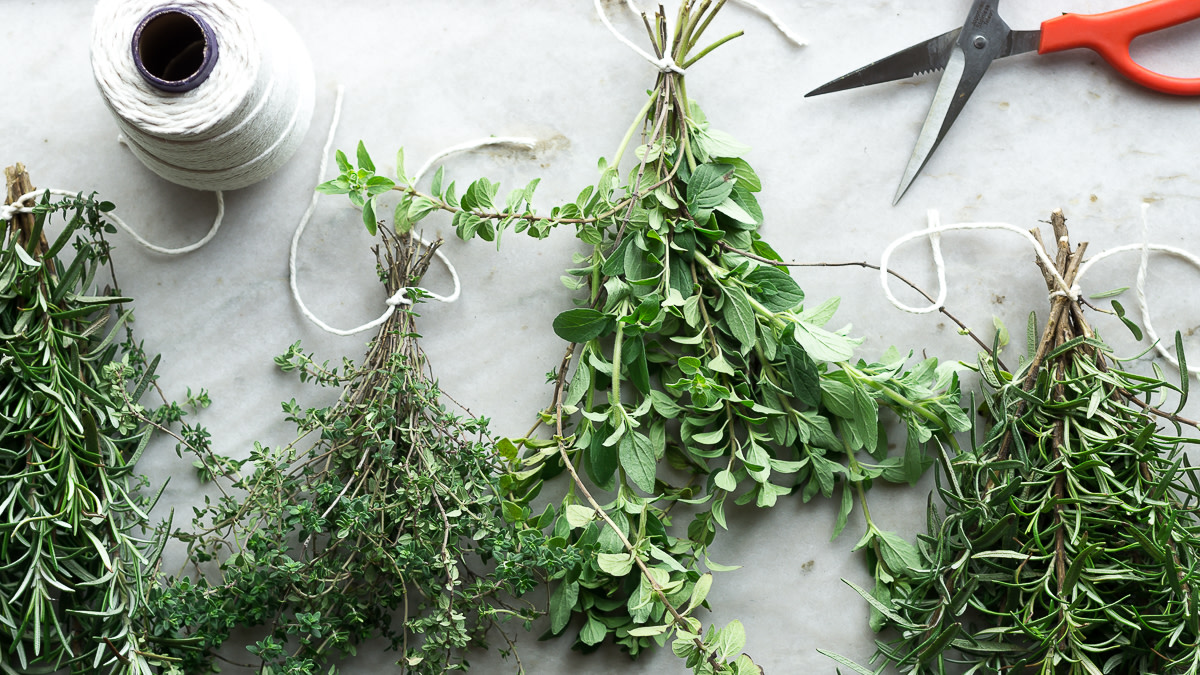
The arrival of spring comes with a long list of to-dos in order to get garden beds in shape for the upcoming growing season. One of those tasks is pruning herbs to stimulate growth and cut out anything dead. This annual cutting yields an abundance of herbs that can’t possibly be used fresh before going bad. Here are six different ways to preserve herbs so you can cook with them all year long.
Dry I dry the bulk of my herbs and refill my pantry spice jars, tossing out anything old and stale, and replacing it with those freshly dried. The best herbs for drying are sturdy with a strong flavor profile such as thyme, rosemary, oregano, and sage. Dill, mint, and lavender also retain their aroma when dried.
There are three ways you can dry herbs. You can air-dry small amounts of herbs naturally by tying them together in a bundle with kitchen twine and hanging upside down for 5 to 7 days. If you have a lot to dry, this might not be practical. Dehydrators are my top choice because I can set the temperature to 95 degrees and walk away until done. The last and quickest way to dehydrate herbs is in the oven. You’ll want to set it at the lowest temperature, spread the herbs across a sheet tray lined with parchment, and bake for an hour. You’ll know the herbs are dry when they crumble to the touch.

Freeze Soft and delicate herbs such as cilantro, parsley, chives, sorrel, and basil, lose their aroma when dried. Freezing these types of herbs preserves their quality the best. To do so, finely chop them with a knife or use a food processor. Pack into ice cubes and either fill with water or oil and freeze. Once they’re frozen, you can pop the cubes out and store them in a resealable freezer bag.
Infuse Oil One of the best ways to preserve the essence of herbs is to infuse them in oil. This is a wonderful way to add layers of flavor when roasting potatoes or whisking up a vinaigrette. Choose hardy herbs like rosemary, sage, thyme, and oregano. Roughly chop a handful of stems into small pieces and add to a cup of olive oil, avocado, or grapeseed oil in a small pot. Heat the oil over the lowest heat setting on your stovetop. After 15 minutes, turn the heat off and let the oil cool to room temperature for an hour or so. Strain the oil before storing it in a jar. It will keep two months in the pantry or six months in the refrigerator.
Herb-Salt Why use plain salt to season food when you can use herb salts? Salt itself is a preservative and will pull the moisture out of the leaves when mixed. They’re shelf-stable and can be used in so many different cooking applications. Among my favorites is a lemon-herb blend with parsley, thyme, lemon zest, and garlic for poultry and vegetables. Another great mix is oregano, lime zest, chili flakes, and garlic.

Compound Butter Compound butter is nothing more than butter blended with a mix of aromatics, and it’s easy to do at home. Start with a stick of butter softened to room temperature, then stir in your favorite flavor combination. A blend of sorrel, chives, parsley, lemon zest, and capers go great on fish, bread, and grilled asparagus. For steaks, I like to use thyme, coarse ground peppercorns, and roasted garlic. You’ll need to use the butter within a week or freeze for up to six months.
Herb Sauces Pesto, chimichurri, Italian salsa verde, or Mexican verde, are oil-based sauces and are a great way to use up a bunch of herbs. They pair well with seafood, red meats, vegetables, pasta, salads, and even tacos. I make big batches of these sauces when I have a lot of herbs to use then portion in small ½ pint jars and freeze for up to a year.
These simple sauces, butter, and oils will take any basic meal to the next level. The next time you have extra basil or rosemary on hand, think twice about letting it go to waste. Use one of these methods to preserve your herbs for the future. You’ll thank yourself later.







Conversation